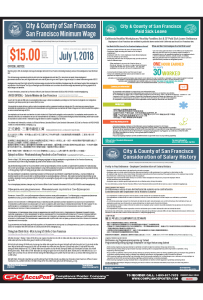 Why prohibit consideration of salary history?
Why prohibit consideration of salary history?
San Francisco employers will notice a new posting when they update their labor law posters this July. The San Francisco Consideration of Salary History Ordinance, which was signed into law last summer, prohibits employers from asking about or using a job applicant’s prior salary history in deciding whether to hire the applicant or what salary to offer. The reason for the law is simple – women continue to earn less than their male counterparts due in large part to longstanding, widespread, gender-based wage disparities in the labor market. When employers use applicants’ current or past salaries to set employees’ pay rates individuals carry these historic wage disparities forward from job to job. As a consequence, women continue to be disadvantaged by gender-based wage differentials. The process perpetuates both wage discrimination and the gender wage gap.
San Francisco’s Consideration of Salary History Ordinance will help ensure that an individual’s prior earnings do not continue to undermine her salary throughout her career. The measure will also help ensure that employers and workers are able to negotiate and set salaries based on the qualifications of the person and the job in question, rather than on the individual’s prior earnings, which may reflect past gender-based wage discrimination.
Who does the law apply to?
The Ordinance applies to all employers that are required to be registered to do business in the City and County of San Francisco. It covers any occupation, vocation, job or work, including part-time, temporary, and seasonal employment, contracted work, contingent work and work on commission.
What does the law prohibit?
Specifically, the law prohibits an employer from:
- inquiring about a job applicant’s prior salary history;
- considering or relying on a job applicant’s prior salary history in deciding whether to hire the applicant or what salary to offer;
- refusing to hire an applicant or retaliating against an applicant for not disclosing salary history;
- releasing the salary history of a current or former employee to a prospective employer without written authorization from the current or former employee, unless required by law or publicly available; or
- using salary history to justify paying an employee of a different sex, race or ethnicity less than a job applicant for substantially similar work.
The law does not prohibit salary negotiations or considering an applicant’s voluntary disclosure of salary history in determining what salary to offer or verifying the applicant’s disclosed salary history.
When is the law effective?
The law goes into effect July 1, 2018. The Office of Labor Standards Enforcement will only issue warnings for first violations between July 1, 2018 and June 30, 2019. Administrative penalties for violations thereafter range from $100 to $500 per violation. Employers are also subject to civil enforcement.
What are the posting requirements?
Employers are required to post the City’s Consideration of Salary History Ordinance in a conspicuous place at every workplace, job site or other place under the employer’s control that employees and applicants frequently visit. Employers can comply with the posting requirement by posting CPC’s combination San Francisco Minimum Wage, Paid Sick Leave and Consideration of Salary History Ordinance Poster.

